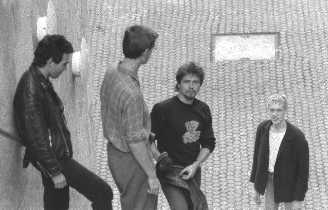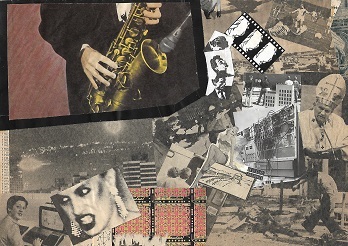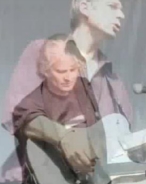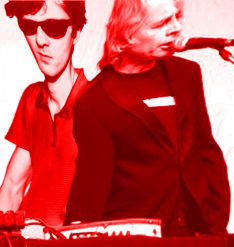|

about the project
L-R:
Peter Prieur (aka 'Pogo') (vocals),
Achim Wollscheid (synthesizers, guitar),
Sea Wanton (vocals, synthesizers),
T.poem (†) (bass, violin, effects),
image courtesy of 'cherrypop',
1982

| NON TOXIQUE LOST: founded
in 1982 in Mainz/Germany, based in Berlin since 1995 -
political, electronic, experimental music ... the
following people contributed to NTL: Achim
Wollscheid, Alex Türpitz, Andy Laaf, Christian Reichelt, DJ
Vrhovny, Elke Dittewig, Heiko Wöhler, Jammin' Unit, Peter
Klum, Peter 'Pogo' Prieur, T.poem (†), Tony Bullock + Sea Wanton |
(recorded in 1982)
(recorded in 2025)
"In the autumn of 1916 two chemists, Wilhelm Lommel and Wilhelm Steinkopf, developed a gas that they named LOST, which was a combination of the first two letters of one of their surnames and the last two letters of the other. LOST was in fact not a gas, but rather a liquid that vaporises at temperature of 217C°."
(taken from: "A sad anniversary: 100 years since 1st mustard gas attack",
published in 2017) |
|
'Non Toxique Lost' began in the early '80s as a German
industrial band that had stuck true ..to the avant-garde / difficult
listening propositions to also come through Throbbing Gristle ..and
Dome. While plenty of other industrialists such as
Psychic TV and
Einstürzende Neubauten ..honed their craft for occluded electronics
with sinister motives into downright catchy tunes, ..'Non Toxique
Lost' chose a murky collage strategy for metal bashing, undulating
electronic ..arppegiations, and megaphone vocal barking. Wanton was
the first album for 'Non Toxique Lost', ..recorded between 1982 and
1984 and released a year later on vinyl. There's an aggressive
deconstruction of sound within the primitive synth-punk arrangements
which get splattered into amassed distortion from guitar freakouts
blowing out of way too small amplifiers on top of lumbering
electronic loops, all of which get cut up and mangled on tape. One
of the early members of 'Non Toxique Lost' was
Achim Wollscheid, who
had also begun his solo project of DIY musique concrete called
S.B.O.T.H.I. before developing his highly conceptual sound art
projects throughout the late '90s. It seems that 'Non Toxique Lost'
is still around, although Wollscheid left many years ago. Either
way, Wanton is a fascinating document of
art-damaged noise from this little known German industrial project.
(source: 'Aquarius Records',
San Francisco, USA) |
 image
courtesy of 'adsx' (Alexander Ton, 2015) image
courtesy of 'adsx' (Alexander Ton, 2015)
notes by T. Pargmann and C. Ressler,
Berlin, 2006
In the beginning of the 80s, the band
'NON TOXIQUE LOST' (short name: 'NTL')
was founded in Mainz, Germany. The eponym for this project was taken
from the term 'mustard gas', a chemical weapon, which had been
invented by the german scientists named 'Lommel' and 'Steinkopf'
during World War I under the acronym of 'LOST' .
Though the band's name refers to the 'unperilous' character of this
music, in the end NON TOXIQUE LOST also acted as a
means for a fight, the very fight against the deadlocked patterns of
the culture of music of that time. Formed by members of some local
'Punk'-bands, founded bei Sea Wanton and A.
Wollscheid (aka S.B.O.T.H.I.). Later on,
S. Schütze aka 'T.poem' joined to
play bass, violin and special (electronic) effects and P.
Prieur, called 'POGO', did the vocals.
Although NTL often has been labelled as part of the 'ndW'
(= 'Neue deutsche Welle') and sometimes even
influences of 'Jazz music' have been (wrongly) mentioned, the band
saw its position in the first instance in the context of an
'industrial movement'. When NTL was founded in
1982, its uncompromising musical approach was significantly inspired
by pioneers of the 'Industrial Music' like Throbbing Gristle,
SPK and Whitehouse.
 ... Out of these
influences, NON TOXIQUE LOST developed its sound as
a trance-esque cocoon of clashing sounds of walls, pulsating
synthethizers, and angry vocals, which draws the listener into an
emotional maelstrom, leading from fear, pain and desperation to rage
and unlimited aggression. From time to time very static and pushed
on by brute rhythms, NTL's music is
uncompromisingly tough and this is exactly why it can be considered
as an anomaly of that Germany of the early 80s. Similarities are
seen more with bands like Pacific 231 (from France)
or Esplendor Geometrico (from Spain). In essence,
there are two important ideas crossing the band's whole oeuvre: the
processing of the 'everyday life' experience, interweaved with an
explicit political attitude. A large impact came from J.
Stender, who had been the founder/a member of P.D.,
then. His talent, to create german lyrics on 'everday life' 'on the
run', conveying the 'concrete' and 'direct' contents, had been a
adequate stylistic device to handle the facts of a 'grey german
reality' of those days. But in contrary to P.D. and
P16.D4, NON TOXIQUE LOST objected
to being classified into the 'art' genre. Indeed, there were some
references to the current 'art'-movements, but the music was not to
be 'avantgarde', even if some external observers could get this
impression. But NTL combined its conceptions about
music with the idea to be creative using existing objects and to,
aside from instruments, also use unconventional sound sources - this
is another example for the realisation of the 'concrete' and
'everyday life'. At the same time, the music has been the radical
expression of an oppositional attitude. With NTL,
Sea Wanton (the singer) realized his intention to
found a band, which dealt with the social and political boredom of
its reality in a challenging way. NTL did not only
intend to distance itself from the reception of music, in general,
but it provoked a concrete hassle with those crusted forms of
understanding music and the culture of the youth. The band was
permanently confronted by an environment which was deeply into the
'Rock-music' culture of the 70s, public places like pubs and
youth-centres were dominated by the 'Hippies' and 'drug-abuse'
cosiness. For a project like NON TOXIQUE LOST that
meant a struggle for 'free-spaces', not hostility, but also the
neccessity to become accepted as something new. To a certain extent,
as an idea of the 'Punk'-movement, the philosophy
of NTL aimed at provocation and the radical
realisation of its own ideas. Accordingly, the turning away from the
established mechanismn of the 'music-business' did not only affect
the musical style, but also the production and merchandising of the
sound storage medium. It was logic for NTL to
select the compact-cassette as a medium for its music. This was
'the' medium, which allowed the musicians as opposed to anything
else, to keep in control over their musical and creative work and a
direct merchandising, without being forced to take part in the
profit-orientated 'machinery' of the 'music-business'. In 1982, the
first recordings were published on the 'd.i.y.'(=do it yourself)
founded 'cassettes only' label called 'CAN CAN',
which were to be followed by ca. 30 further releases. Inspite of
this high grade of productivity, encompassing mostly the studio- and
'live' material of NTL, but also some
cassette-compilations featuring some 'international industrial'
bands, NTL and 'CAN CAN' remained
a creative 'action-area', which was not perceived as a 'full time
job' or even as the 'meaning of life'. For a first vinyl release, a
strictly limited edition, you had to wait for some years. The songs
on the lp-album, called 'Wanton', released in 1986,
a selection of material, which had been published earlier on
compact-cassette, expresses something like a 'subtile' toughness (on
a long range), which drills slowly in your auditory canal and the
band herself accurately characterises it as 'industrial
muzak'. As opposed to the high output on sound-medium there
were only rare chances to experience the band on stage. Only a few
events like those in Mainz and Trier (Germany), at the 'Recloose
Festival' in London, in Amsterdam, at the 'Geminox-Festival'
in Frankfurt (Germany) or at the 'Berlin Atonal 2 Festival'
took place. ... Out of these
influences, NON TOXIQUE LOST developed its sound as
a trance-esque cocoon of clashing sounds of walls, pulsating
synthethizers, and angry vocals, which draws the listener into an
emotional maelstrom, leading from fear, pain and desperation to rage
and unlimited aggression. From time to time very static and pushed
on by brute rhythms, NTL's music is
uncompromisingly tough and this is exactly why it can be considered
as an anomaly of that Germany of the early 80s. Similarities are
seen more with bands like Pacific 231 (from France)
or Esplendor Geometrico (from Spain). In essence,
there are two important ideas crossing the band's whole oeuvre: the
processing of the 'everyday life' experience, interweaved with an
explicit political attitude. A large impact came from J.
Stender, who had been the founder/a member of P.D.,
then. His talent, to create german lyrics on 'everday life' 'on the
run', conveying the 'concrete' and 'direct' contents, had been a
adequate stylistic device to handle the facts of a 'grey german
reality' of those days. But in contrary to P.D. and
P16.D4, NON TOXIQUE LOST objected
to being classified into the 'art' genre. Indeed, there were some
references to the current 'art'-movements, but the music was not to
be 'avantgarde', even if some external observers could get this
impression. But NTL combined its conceptions about
music with the idea to be creative using existing objects and to,
aside from instruments, also use unconventional sound sources - this
is another example for the realisation of the 'concrete' and
'everyday life'. At the same time, the music has been the radical
expression of an oppositional attitude. With NTL,
Sea Wanton (the singer) realized his intention to
found a band, which dealt with the social and political boredom of
its reality in a challenging way. NTL did not only
intend to distance itself from the reception of music, in general,
but it provoked a concrete hassle with those crusted forms of
understanding music and the culture of the youth. The band was
permanently confronted by an environment which was deeply into the
'Rock-music' culture of the 70s, public places like pubs and
youth-centres were dominated by the 'Hippies' and 'drug-abuse'
cosiness. For a project like NON TOXIQUE LOST that
meant a struggle for 'free-spaces', not hostility, but also the
neccessity to become accepted as something new. To a certain extent,
as an idea of the 'Punk'-movement, the philosophy
of NTL aimed at provocation and the radical
realisation of its own ideas. Accordingly, the turning away from the
established mechanismn of the 'music-business' did not only affect
the musical style, but also the production and merchandising of the
sound storage medium. It was logic for NTL to
select the compact-cassette as a medium for its music. This was
'the' medium, which allowed the musicians as opposed to anything
else, to keep in control over their musical and creative work and a
direct merchandising, without being forced to take part in the
profit-orientated 'machinery' of the 'music-business'. In 1982, the
first recordings were published on the 'd.i.y.'(=do it yourself)
founded 'cassettes only' label called 'CAN CAN',
which were to be followed by ca. 30 further releases. Inspite of
this high grade of productivity, encompassing mostly the studio- and
'live' material of NTL, but also some
cassette-compilations featuring some 'international industrial'
bands, NTL and 'CAN CAN' remained
a creative 'action-area', which was not perceived as a 'full time
job' or even as the 'meaning of life'. For a first vinyl release, a
strictly limited edition, you had to wait for some years. The songs
on the lp-album, called 'Wanton', released in 1986,
a selection of material, which had been published earlier on
compact-cassette, expresses something like a 'subtile' toughness (on
a long range), which drills slowly in your auditory canal and the
band herself accurately characterises it as 'industrial
muzak'. As opposed to the high output on sound-medium there
were only rare chances to experience the band on stage. Only a few
events like those in Mainz and Trier (Germany), at the 'Recloose
Festival' in London, in Amsterdam, at the 'Geminox-Festival'
in Frankfurt (Germany) or at the 'Berlin Atonal 2 Festival'
took place.
 L-R: Achim Wollscheid (guitar) + T.Poem
(tubes).
image courtesy of 'Mr. Slut' aka 'Graf Haufen' (1983)
L-R: Achim Wollscheid (guitar) + T.Poem
(tubes).
image courtesy of 'Mr. Slut' aka 'Graf Haufen' (1983)
Even though the performance at the 'Berlin Atonal 2
Festival' got an especially good reputation and
positive feedbacks with those 'friends' of 'abstract music', NTL
remained true to itself and did not devise any ambitions to change
its strategies of merchandising. The band was more interested in the
construction of a national and international community of producers
and listeners of 'abstract' and 'experimental' music. There was a
little network(ing) in the Mainz, Wiesbaden and Frankfurt - area
(Germany), e.g., in the atmosphere of the 'Selektion'
label (with groups like P16.D4 and
S.B.O.T.H.I.), resulting in friendly contacts and sometimes
personal cooperations within the music processes (including some
sessions and live-performances). More contacts were established with
'Graf Haufen' (Berlin) and soon reached out to
'cassettes only' labels, based in France, the U.K. and Italy.
Besides his membership with NTL, Sea Wanton
had started publishing a fanzine called 'Handbook of Fun'
in 1983, which intended to be a medium for subversive communication.
The fanzine had been a means to distribute words and artworks
('collages'), which pointed out the protest against the established
structures of the societies and understanding of 'art' or crusted
'music-cultures', and thereby it can be interpreted as a printed
form of 'the same', which was also articulated by NTL's
music. Furthermore the 'Handbook of Fun'
constituted a forum for experimental music, distributing
contact-addresses (with different 'cassettes-only' labels or juicy
record-shops), thus being part of an international network of the 'industrial
scene of the 80s'. NTL came up against
those established patterns of their environment with a radical
'musical' denial, even though expressed in a distinct (german)
language, only very few could understand. You could say, that this
pull-esque, rhythmical toughness of some tracks, which meanwhile is
an essential part with numerous 'industrial bands', appeared some
years 'too early'. The fact, that this music caused more embarassing
to irritating reactions by most listeners, plus the consequent
policy of publications and the responsibility for the 'subversive
underground', are (presumably) the cause for being known by the
'in-crowd', until now. Even though or exactly because the 'hearing
customs' have changed in these last decades, the music of
NTL has kept hold of its attraction as a 'pioneer'
achievement of the so-called 'rhythmical Industrial'.
Since some years, Sea Wanton, accompanied by new
companions, is again active as NON TOXIQUE LOST.
While now using contemporary sound sources like samplers and
computers, it is (as always) bound to the idea of electronic
toughness and a political attitude and, thus, creating its own
musical cosmos. Parallel to this, a selection of early
tape-recordings has been re-released on vinyl and gives a fine
overview on the complete works of the band.
(label: VOD-Records, product id: VOD13, title:
ogre-sse, type: lp-album)
 |
L-R:
Achim Wollscheid - Sea Wanton (2008, artwork: Sea Wanton)

L-R:
Jammin' Unit & Sea Wanton (2015, artwork: Jammin' Unit)

|
![]()

 image
courtesy of 'adsx' (Alexander Ton, 2015)
image
courtesy of 'adsx' (Alexander Ton, 2015)

 ... Out of these
influences, NON TOXIQUE LOST developed its sound as
a trance-esque cocoon of clashing sounds of walls, pulsating
synthethizers, and angry vocals, which draws the listener into an
emotional maelstrom, leading from fear, pain and desperation to rage
and unlimited aggression. From time to time very static and pushed
on by brute rhythms, NTL's music is
uncompromisingly tough and this is exactly why it can be considered
as an anomaly of that Germany of the early 80s. Similarities are
seen more with bands like Pacific 231 (from France)
or Esplendor Geometrico (from Spain). In essence,
there are two important ideas crossing the band's whole oeuvre: the
processing of the 'everyday life' experience, interweaved with an
explicit political attitude. A large impact came from J.
Stender, who had been the founder/a member of P.D.,
then. His talent, to create german lyrics on 'everday life' 'on the
run', conveying the 'concrete' and 'direct' contents, had been a
adequate stylistic device to handle the facts of a 'grey german
reality' of those days. But in contrary to P.D. and
P16.D4, NON TOXIQUE LOST objected
to being classified into the 'art' genre. Indeed, there were some
references to the current 'art'-movements, but the music was not to
be 'avantgarde', even if some external observers could get this
impression. But NTL combined its conceptions about
music with the idea to be creative using existing objects and to,
aside from instruments, also use unconventional sound sources - this
is another example for the realisation of the 'concrete' and
'everyday life'. At the same time, the music has been the radical
expression of an oppositional attitude. With NTL,
Sea Wanton (the singer) realized his intention to
found a band, which dealt with the social and political boredom of
its reality in a challenging way. NTL did not only
intend to distance itself from the reception of music, in general,
but it provoked a concrete hassle with those crusted forms of
understanding music and the culture of the youth. The band was
permanently confronted by an environment which was deeply into the
'Rock-music' culture of the 70s, public places like pubs and
youth-centres were dominated by the 'Hippies' and 'drug-abuse'
cosiness. For a project like NON TOXIQUE LOST that
meant a struggle for 'free-spaces', not hostility, but also the
neccessity to become accepted as something new. To a certain extent,
as an idea of the 'Punk'-movement, the philosophy
of NTL aimed at provocation and the radical
realisation of its own ideas. Accordingly, the turning away from the
established mechanismn of the 'music-business' did not only affect
the musical style, but also the production and merchandising of the
sound storage medium. It was logic for NTL to
select the compact-cassette as a medium for its music. This was
'the' medium, which allowed the musicians as opposed to anything
else, to keep in control over their musical and creative work and a
direct merchandising, without being forced to take part in the
profit-orientated 'machinery' of the 'music-business'. In 1982, the
first recordings were published on the 'd.i.y.'(=do it yourself)
founded 'cassettes only' label called 'CAN CAN',
which were to be followed by ca. 30 further releases. Inspite of
this high grade of productivity, encompassing mostly the studio- and
'live' material of NTL, but also some
cassette-compilations featuring some 'international industrial'
bands, NTL and 'CAN CAN' remained
a creative 'action-area', which was not perceived as a 'full time
job' or even as the 'meaning of life'. For a first vinyl release, a
strictly limited edition, you had to wait for some years. The songs
on the lp-album, called 'Wanton', released in 1986,
a selection of material, which had been published earlier on
compact-cassette, expresses something like a 'subtile' toughness (on
a long range), which drills slowly in your auditory canal and the
band herself accurately characterises it as 'industrial
muzak'. As opposed to the high output on sound-medium there
were only rare chances to experience the band on stage. Only a few
events like those in Mainz and Trier (Germany), at the 'Recloose
Festival' in London, in Amsterdam, at the 'Geminox-Festival'
in Frankfurt (Germany) or at the 'Berlin Atonal 2 Festival'
took place.
... Out of these
influences, NON TOXIQUE LOST developed its sound as
a trance-esque cocoon of clashing sounds of walls, pulsating
synthethizers, and angry vocals, which draws the listener into an
emotional maelstrom, leading from fear, pain and desperation to rage
and unlimited aggression. From time to time very static and pushed
on by brute rhythms, NTL's music is
uncompromisingly tough and this is exactly why it can be considered
as an anomaly of that Germany of the early 80s. Similarities are
seen more with bands like Pacific 231 (from France)
or Esplendor Geometrico (from Spain). In essence,
there are two important ideas crossing the band's whole oeuvre: the
processing of the 'everyday life' experience, interweaved with an
explicit political attitude. A large impact came from J.
Stender, who had been the founder/a member of P.D.,
then. His talent, to create german lyrics on 'everday life' 'on the
run', conveying the 'concrete' and 'direct' contents, had been a
adequate stylistic device to handle the facts of a 'grey german
reality' of those days. But in contrary to P.D. and
P16.D4, NON TOXIQUE LOST objected
to being classified into the 'art' genre. Indeed, there were some
references to the current 'art'-movements, but the music was not to
be 'avantgarde', even if some external observers could get this
impression. But NTL combined its conceptions about
music with the idea to be creative using existing objects and to,
aside from instruments, also use unconventional sound sources - this
is another example for the realisation of the 'concrete' and
'everyday life'. At the same time, the music has been the radical
expression of an oppositional attitude. With NTL,
Sea Wanton (the singer) realized his intention to
found a band, which dealt with the social and political boredom of
its reality in a challenging way. NTL did not only
intend to distance itself from the reception of music, in general,
but it provoked a concrete hassle with those crusted forms of
understanding music and the culture of the youth. The band was
permanently confronted by an environment which was deeply into the
'Rock-music' culture of the 70s, public places like pubs and
youth-centres were dominated by the 'Hippies' and 'drug-abuse'
cosiness. For a project like NON TOXIQUE LOST that
meant a struggle for 'free-spaces', not hostility, but also the
neccessity to become accepted as something new. To a certain extent,
as an idea of the 'Punk'-movement, the philosophy
of NTL aimed at provocation and the radical
realisation of its own ideas. Accordingly, the turning away from the
established mechanismn of the 'music-business' did not only affect
the musical style, but also the production and merchandising of the
sound storage medium. It was logic for NTL to
select the compact-cassette as a medium for its music. This was
'the' medium, which allowed the musicians as opposed to anything
else, to keep in control over their musical and creative work and a
direct merchandising, without being forced to take part in the
profit-orientated 'machinery' of the 'music-business'. In 1982, the
first recordings were published on the 'd.i.y.'(=do it yourself)
founded 'cassettes only' label called 'CAN CAN',
which were to be followed by ca. 30 further releases. Inspite of
this high grade of productivity, encompassing mostly the studio- and
'live' material of NTL, but also some
cassette-compilations featuring some 'international industrial'
bands, NTL and 'CAN CAN' remained
a creative 'action-area', which was not perceived as a 'full time
job' or even as the 'meaning of life'. For a first vinyl release, a
strictly limited edition, you had to wait for some years. The songs
on the lp-album, called 'Wanton', released in 1986,
a selection of material, which had been published earlier on
compact-cassette, expresses something like a 'subtile' toughness (on
a long range), which drills slowly in your auditory canal and the
band herself accurately characterises it as 'industrial
muzak'. As opposed to the high output on sound-medium there
were only rare chances to experience the band on stage. Only a few
events like those in Mainz and Trier (Germany), at the 'Recloose
Festival' in London, in Amsterdam, at the 'Geminox-Festival'
in Frankfurt (Germany) or at the 'Berlin Atonal 2 Festival'
took place.
 L-R: Achim Wollscheid (guitar) + T.Poem
(tubes).
L-R: Achim Wollscheid (guitar) + T.Poem
(tubes).
